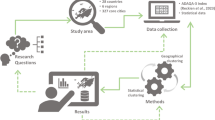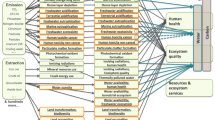Abstract
Over the past few decades Integrated Assessment (IA) has emerged as an approach to link knowledge and action in a way that is suitable to accommodate uncertainties, complexities and value diversities of global environmental risks. Responding to the complex nature of the climate problem and to the changing role of climate change in the international climate policy process, the scientific community has started to include stakeholder knowledge and perspectives in their assessments. Participatory Integrated Assessment (PIA) is in its early stage of development. Methodology varies strongly across PIA projects. This paper analyzes four recent IA projects of climate change that included knowledge or perspectives from stakeholders in one-way or another. Approaches and methods used turn out to differ in whether stakeholders are involved actively or passively, whether the approach is bottom-up or top-down, and whether the different functions in the IA process are open or closed to stakeholder input. Also, differences can be seen in the degree to which boundaries are pre-set that limit the roles and domains of competencies attributed to each scientific or non-scientific participant (so-called boundary work). The paper discusses pros and cons of the various approaches identified, and outlines heuristics and considerations to assist those who plan, design or fund new IA processes with stakeholder input on what approaches best to choose in view of the objectives for stakeholder involvement, in view of the role that the IA plays in the overall risk management process and in view of considerations regarding boundary work.
Similar content being viewed by others
References
Bailey, P., Gough, C., Chadwick, M., and McGranahan, G.: 1996, Methods for Integrated Environmental Assessment: Research directions for the European Union, Stockholm Environment Institute, Stockholm.
Berk, M., Den Elzen, M., and Metz, B.: 2001, Differentiatie van Toekomstige Inspanningen in het kader van het Klimaatverdrag: Enkele Verkennende Berekeningen ten Behoeve van het NMP-4, RIVM, Bilthoven, The Netherlands, RIVM report No. 728001018.
Bolin, B., Döös, B. R., Jäger, J., and Warrick, R. A.: 1986, The Greenhouse Effect, Climatic Change and Ecosystems, SCOPE 29, Wiley, Chichester.
Dahinden, U., Querol, C., Jäger, J., and Nilsson, M.: 2003, ‘Citizens interaction with computer models’, in Kasemir, B., Jäger, J., Jaeger, C. C., and Gardner, M. T. (eds.), Public Participation in Sustainability Science: A Handbook, Cambridge University Press, Cambridge.
Darier, É., Jaeger, C., Kasemir, B., Schüle, R., Shackley, S., and Wynne, B.: 1998, Contributions to Participatory Integrated Assessment, Darmstadt University of Technology, Darmstadt, Germany, ULYSSES Working Paper WP-98-1.
Douglas, M. and Wildavsky, A.: 1982, Risk and Culture, University of California Press, Berkeley.
Dunn, W. N.: 1997, Cognitive Impairment and Social Problem Solving: Some Tests for Type III Errors in Policy Analysis, Graduate School of Public and International Affairs, University of Pittsburgh, Pittsburgh.
Dunn, W. N.: 1998, Pragmatic Eliminative Induction: Proximal Range and Context Validation in Applied Social Experimentation, Graduate School of Public and International Affairs, University of Pittsburgh, Pittsburgh, GSPIA working paper 001.
Dunn, W. N.: 2001, ‘Using the Method of Context Validation to Mitigate Type III errors in Environmental Policy Analysis’, in Hisschemöller, M., Hoppe, R., Dunn, W. N., and Ravetz, J. R. (eds.), Knowledge, Power, and Participation in Environmental Policy Analysis, Policy Studies Review Annual, Volume 12, Transaction Publishers, New Brunswick, NJ, pp. 417–436.
Fransella, F. and Bannister, D.: 1977, A Manual for Repertory Grid Technique, Academic, London.
Funtowicz, S. O. and Ravetz, J. R.: 1992, ‘Three types of risk assessment and the emergence of post-normal science’, in Krimsky, S. and Golding, D. (eds.), Social Theories of Risk, Greenwood, Westport, CT, pp. 251–273.
Funtowicz, S. O. and Ravetz, J. R.: 1993, ‘Science for the post-normal age’, Futures 25, 739–755.
Funtowicz, S. O. and Ravetz, J.: 1996, ‘Risk Management, post-normal science, and extended peer communities’, in Hood, C. and Jones, D. K.C. (eds.), Accident and Design, Contemporary Debates in Risk Management, UCL Press, London, Bristol, PA, pp. 172–182.
Gieryn, T. F.: 1983, ‘Boundary-work and the demarcation of science from non-science: Strains and interests in professional ideologies of scientists’, American Sociological Review 48, 781– 795.
Hisschemöller, M., De Boer, J., Breukels, M., Dunn, W. N., and Van der Sluijs, J. P.: 2000, Climate Risk Assessment: Evaluation of Approaches, Working document 1, Department of Science Technology and Society, Utrecht University, Utrecht, The Netherlands.
Hisschemöller, M., Van de Kerkhof, M., Annema, J. A., Folkert, R., Kok, M., Spakman, J., Faaij, A., Treffers, D. J., De Jager, D., Jeeninga, H., Kroon, P., Seebregts, A., and Spanjersberg, M.: 2002, Climate OptiOns for the Long-term (COOL) – National Dialogue, IVM-VU, Amsterdam, The Netherlands, IVM report No. E-01-05 and NRP report No. 410 200 116.
Janis, I. L.: 1982, Groupthink: Psychological Studies of Policy Decisions and Fiascoes, Houghton, Mifflin, Boston.
Jasanoff, S.: 1990, The Fifth Branch: Science Advisers as Policy Makers, Harvard University Press, Cambridge, MA.
Kates, R. W., Hohenemser, C., and Kasperson, J. X. (eds.): 1985, Perilous Progress: Managing the Hazards of Technology, Westview Press, Boulder.
Kasemir, B., Dahinden, U., Gerger, Å., Schüle, R., Tàbara, D., and Jaeger, C.: 1999, Fear, Hope and Ambiguity: Citizens’ Perspectives on Climate Change and Energy Use, Darmstadt University of Technology, Darmstadt, Germany, ULYSSES Working Paper WP-99-1.
Kasemir, B., Jäger, J., and Jaeger, C. C.: 2003, ‘Citizen participation in sustainability assessments’, in Kasemir, B., Jäger, J., Jaeger, C. C., and Gardner, M. T. (eds.), Public Participation in Sustainability Science: A Handbook, Cambridge University Press, Cambridge, pp. 3–36.
Mostert, E.: 2003, ‘The challenge of public participation’, Water Policy 5, 179–197.
Nakicenovic, N. and Swart, R. (eds.): 2000, Special Report on Emissions Scenarios: A Special Report of Working Group III of the Intergovernmental Panel on Climate Change, Cambridge University Press, Cambridge.
Querol, C., Gerger, Å., Kasemir, B., and Tàbara, D.: 1999, Citizens’ Recommendations for Addressing Climate Change: A Participatory Integrated Assessment Exercise in Europe, Darmstadt University of Technology, Darmstadt, Germany, ULYSSES Working Paper WP-99-4.
Raifa, H.: 1968, Decision Analysis, Addison-Wesley, Reading, MA.
Ravetz, J. R. and Funtowicz, S. O.: 1999, ‘Post-normal science – An insight now maturing’, Futures 31, 641–646.
Risbey, J., Kandlikar, M., and Patwardhan, A.: 1996, ‘Assessing integrated assessments’, Clim. Change 34, 369–395.
Rotmans, J.: 1998, ‘Methods for IA: The challenges and opportunities ahead’, Environ. Model. Assess. 3, 155–179.
Rotmans, J. and Dowlatabadi, H.: 1997, ‘Integrated assessment modelling’, in Rayner, S. and Malone, E. L. (eds.), Human Choice and Climate Change, Vol. 3. The Tools for Policy Analysis, Battle Press, Columbus, OH, pp. 291–377.
Rotmans, J. and De Vries, B.: 1997, Perspectives on Global Change, The TARGETS Approach, Cambridge University Press, Cambridge.
Sors, A., Liberatore, A., Funtowicz, S. O., Hourcade, J. C., and Fellous, J. L. (eds.): 1997, Proceedings of the International Symposium – Prospects for Integrated Assessment: Lessons Learnt from the Case of Climate Change, European Commission DG XII, Toulouse, France, October 24–26, 1996.
Sprinz, D. and Luterbacher, U.: 1996, International Relations and Global Climate Change, Potsdam Institute for Climate Impact Research, Potsdam, Germany, PIK report No. 21.
Stern, P. C. and Fineberg, H. V. (eds.): 1996, Understanding Risk, Informing Decisions in a Democratic Society, National Research Council, National Academy Press, Washington, DC.
The Social Learning Group: 2001, Learning to Manage Global Environmental Risks: A Comparative History of Social Responses to Climate Change, Ozone Depletion and Acid Rain, MIT Press, Cambridge, MA.
Toth, F. L. and Hizsnyik, E.: 1998, ‘Integrated environmental assessment methods: Evolution and applications’, Environ. Model. Assess. 3, 193–207.
Van Asselt, M. B. A. and Rotmans, J.: 1997, ‘Uncertainties in perspective’, in Rotmans, J. and De Vries, B. (eds.), Perspectives on Global Change: The TARGETS Approach, Cambridge University Press, Cambridge.
Van Asselt, M. B. A. and Rijkens-Klomp, N.: 2002, ‘A look in the mirror: Reflection on participation in integrated assessment from a methodological perspective’, Global Environ. Change 12, 167–184.
Van de Kerkhof, M.: 2004, Debating Climate Change. A Study on Stakeholder Participation in an Integrated Assessment of Long-Term Climate Policy in the Netherlands, Lemma Publishing, Utrecht, the Netherlands.
Van de Kerkhof, M., Hisschemöller, M., and Spanjersberg, M.: 2003, ‘Shaping diversity in participatory foresight studies: Experiences with interactive backcasting in a stakeholder assessment on long-term climate policy in The Netherlands’, Greener Manage. Int. 37, 85–99.
Van der Sluijs, J. P.: 1997, Anchoring Amid Uncertainty: On the Management of Uncertainties in Risk Assessment of Anthropogenic Climate Change, Ph.D. Thesis, Utrecht University, Utrecht, The Netherlands.
Van der Sluijs, J. P.: 2001, ‘Integrated assessment models and the participatory challenge: The case of climate change’, in Dunn, W. N., Hisschemöller, M., Hoppe, R., and Ravetz, J. R. (eds.), Knowledge, Power, and Participation in Environmental Policy Analysis, Policy Studies Review Annual, Vol. 12, Transaction Publishers, New Brunswick, NJ, pp. 317–348.
Van der Sluijs, J. P.: 2002, ‘A way out of the credibility crisis of models used in integrated environmental assessment’, Futures 34, 133–146.
Van der Sluijs, J. P., Van Eijndhoven, J. C. M., Wynne, B., and Shackley, S.: 1998, ‘Anchoring devices in science for policy: The case of consensus around climate sensitivity’, Soc. Stud. Sci. 28, 291–323.
Van der Sluijs, J. P. and Lourens, P.: 2000, Climate Risk Assessment: Evaluation of Approaches, Working document 2, Department of Science Technology and Society, Utrecht University, Utrecht, The Netherlands.
Van der Sluijs, J. P., Hisschemöller, M., De Boer, J., and Kloprogge, P.: 2002, Climate Risk Assessment: Evaluation of Approaches, Synthesis Report, Department of Science Technology and Society, Utrecht University, Utrecht, The Netherlands, NW&S report No. E-2002-96.
World Bank: 1996, The World Bank Participation Sourcebook, The World Bank, Washington.
World Meteorological Organisation: 1989, Proceedings of the World Conference on the Changing Atmosphere: Implications for Global Security, WMO, Toronto, 27–30 June 1988, report No. 710.
Yosie, F. T. and Herbst, T. D.: 1998, Using stakeholder processes in environmental decision-making: An evaluation of lessons learned, key issues and future challenges, Ruder Finn Washington, ICF Incorporated, Washington, http://www.gdrc.org/decision/nr98ab01.pdf
Author information
Authors and Affiliations
Corresponding author
Rights and permissions
About this article
Cite this article
Kloprogge, P., Sluijs, J.P.V.D. The Inclusion of Stakeholder Knowledge and Perspectives in Integrated Assessment of Climate Change. Climatic Change 75, 359–389 (2006). https://doi.org/10.1007/s10584-006-0362-2
Received:
Revised:
Issue Date:
DOI: https://doi.org/10.1007/s10584-006-0362-2




